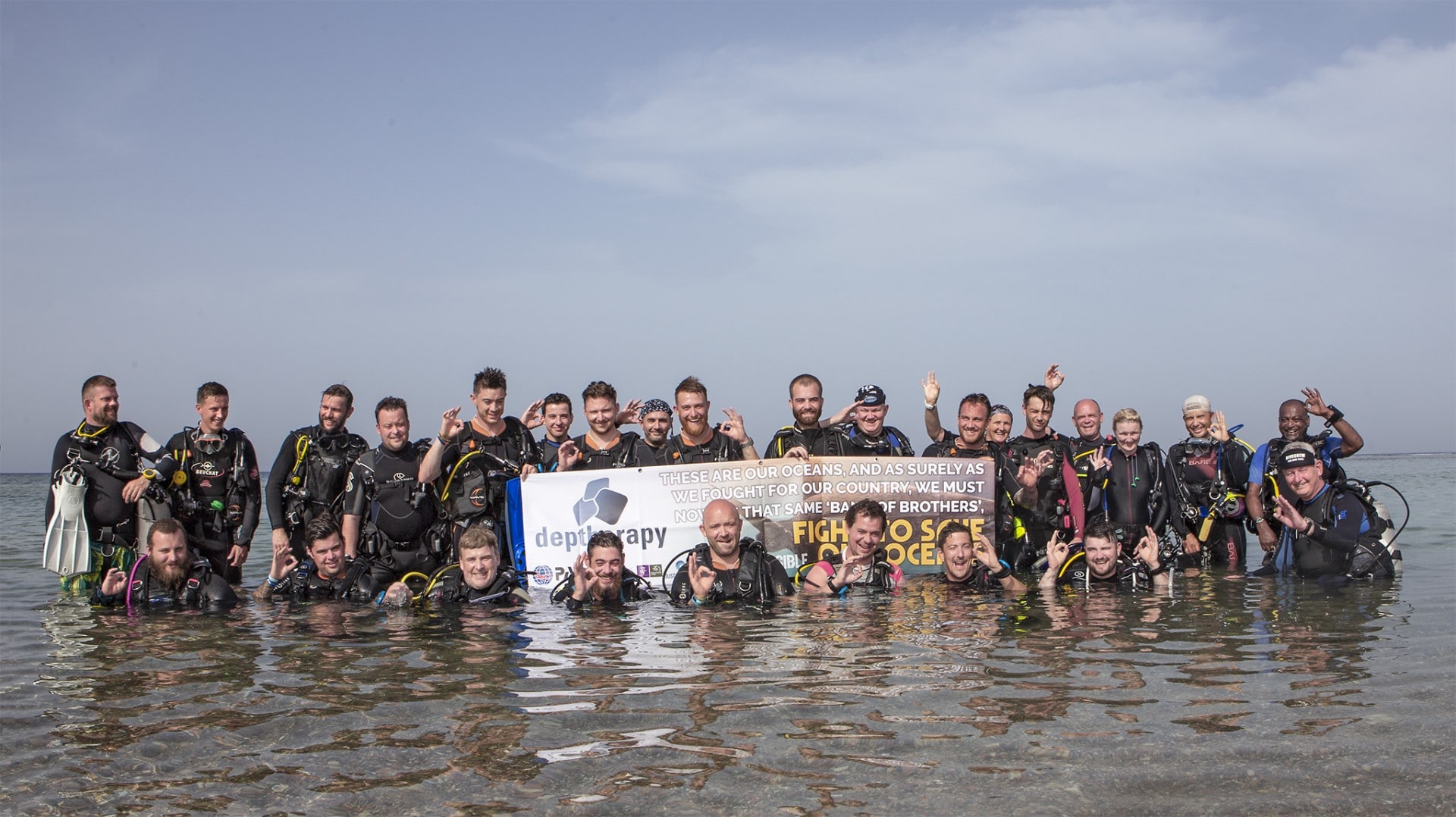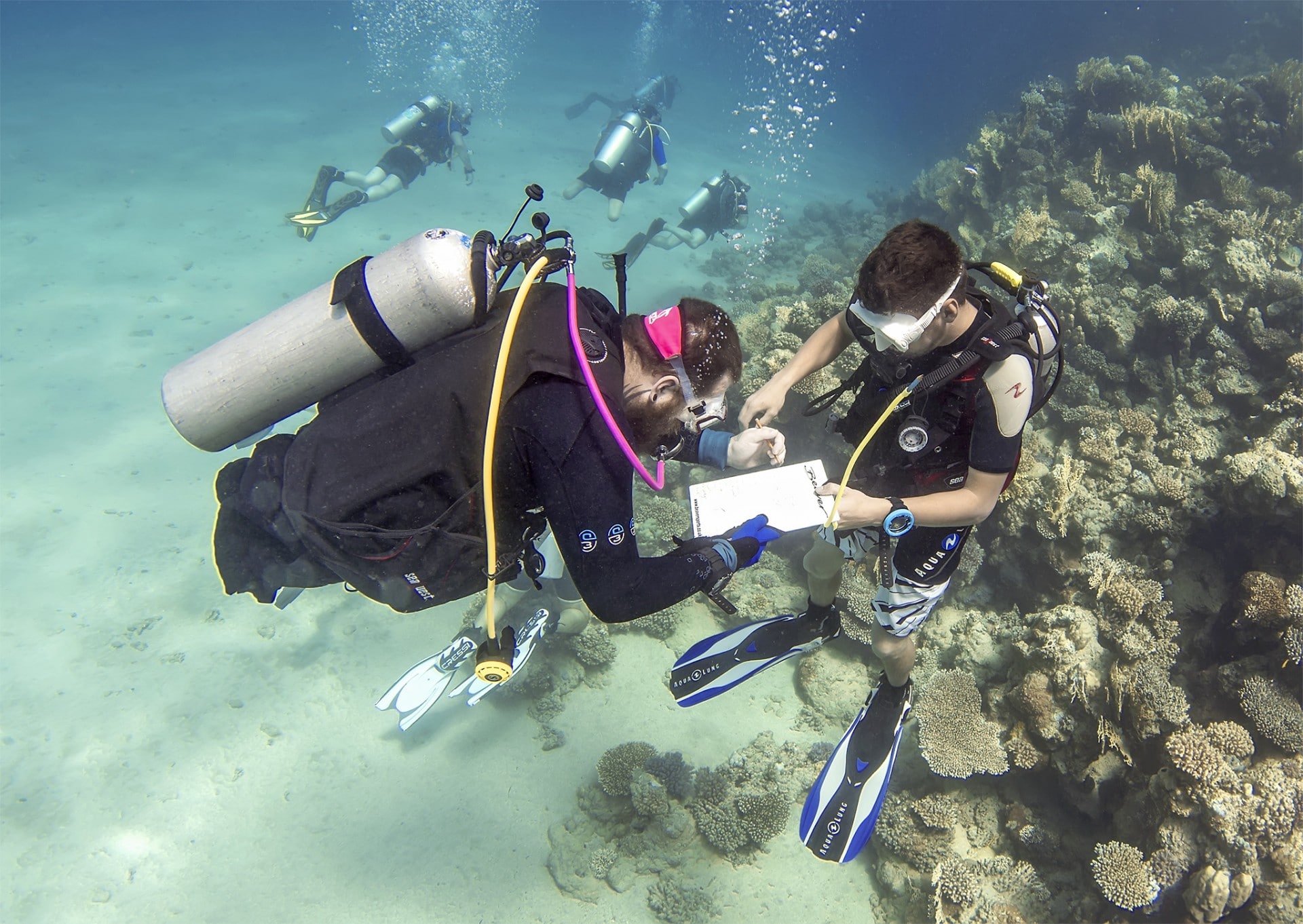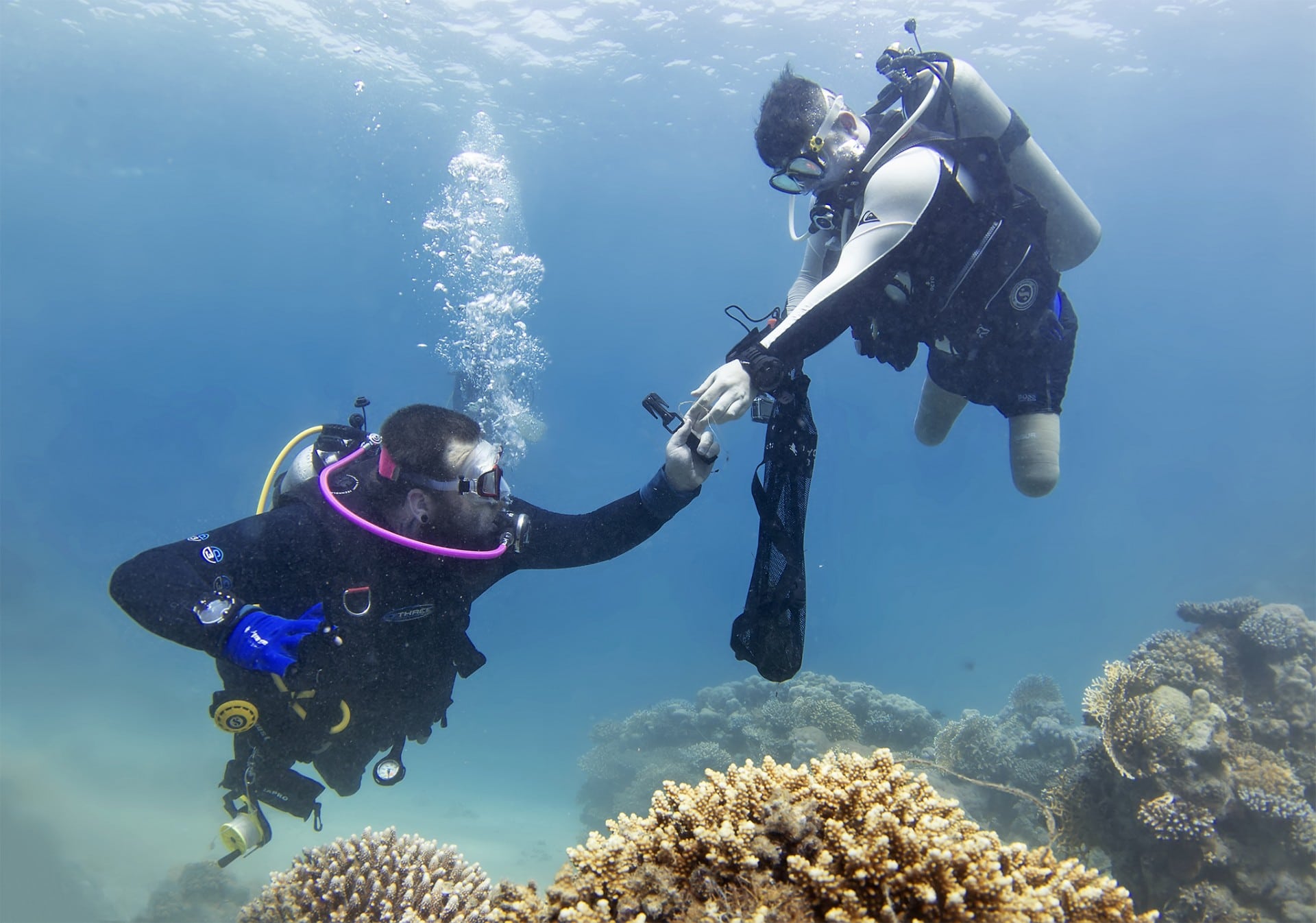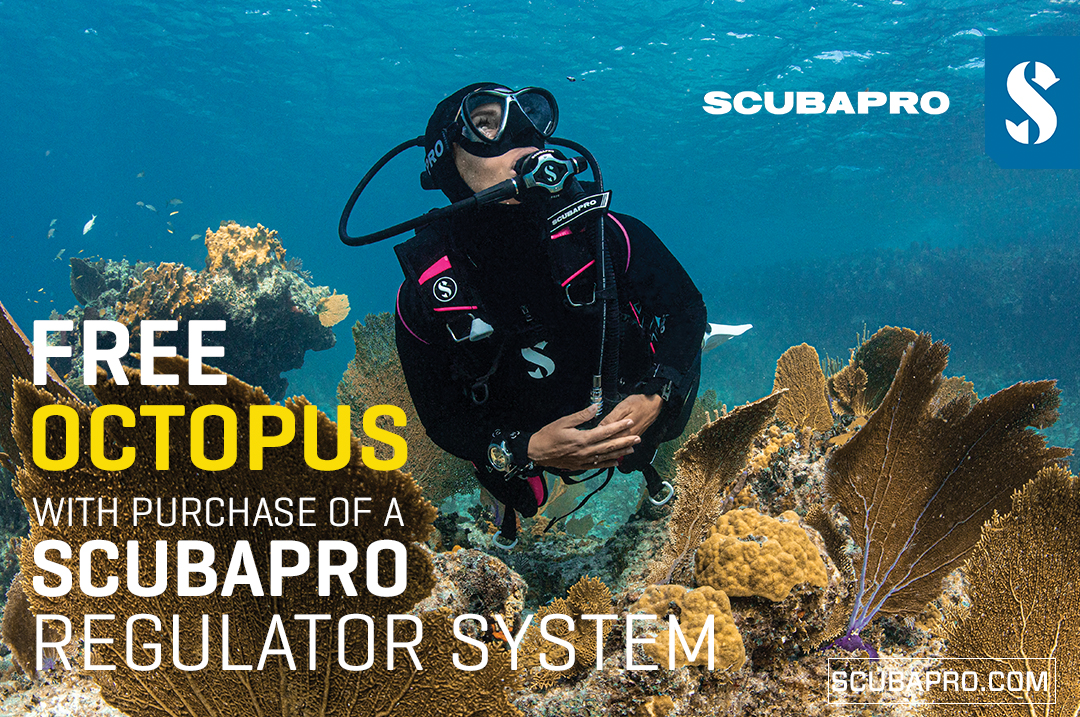News
Team Deptherapy gives back in latest Red Sea success

Five new PADI Open Water Divers, three new PADI Advanced Open Water and Deep Divers, seven new Coral Conservation Divers and four new Deptherapy Education Professionals… that’s the tally of success from Team Deptherapy’s latest Red Sea expedition.
At the end of May 2018, UK scuba diving rehabilitation charity Deptherapy held it’s largest ever expedition to the Egyptian Red Sea. A team of 25, including 17 wounded in service veterans, all suffering from life changing physical and / or mental injuries, travelled to Roots Dive Camp in El Quseir as part of Team Deptherapy.
The expedition also marked the beginning of Deptherapy’s ‘Protecting Our Oceans’ project – an ongoing campaign to raise awareness of the fragility of the world’s oceans, ensuring that each Deptherapy Programme Member ‘gives back’ to the marine environment that has so helped in their rehabilitation.
During the expedition, all Programme Members took part in a ‘Dive Against Debris’ underwater and beach clean up, successfully removing over 1 kilometre of entangled fishing line.

Deptherapy Programme Members Andy Searle and Jon Beever take part in the coral reef surveying and conservation course. Photo – Dmitry Knyazev for Deptherapy
Seven of the Programme Members also undertook a coral reef surveying and conservation course, led by Tom Dallison, Head of Science at Coral Cay Conservation. The aim of the five-day course was to develop skills in underwater environmental survey techniques and species identification, in order to prepare the divers for an expedition to Truk Lagoon this August.
Tom Dallison said:
“Deptherapy’s Protecting Our Oceans project now has seven passionate and knowledgeable ambassadors. In times where the future of our coral reefs and Oceans can look bleak, the efforts taken by environmental stewards, and the wider public, to actively protect these systems are critical. With an increased affinity to the marine world and a new perspective on the complexity and beauty of coral reefs, those heading to Truk are in good hands. I am truly grateful for the week spent with the Deptherapy team. I wish them all the best for the future and have no doubt that they will triumph in Truk Lagoon.”
Team Deptherapy was led by Deptherapy Ambassador and newly appointed Trustee, former Royal Engineer Ben Lee. Double-amputee Ben is currently training to be a Divemaster and recently won the Royal Foundation’s Endeavour Fund ‘Recognising Achievement’ Award.

Deptherapy Programme Members Andy Searle and Ben Lee on the Dive Against Debris. Photo – Dmitry Knyazev for Deptherapy
The charity is now focusing on the build up to the Truk Lagoon expedition, which will take place from 3rd to 17th August 2018. This major expedition is funded by the Chancellor of the Exchequer’s 2016 Libor Fund.
Ben Lee is already working with other expedition members to formulate the plan for mapping the wreck of the former Naval Tanker, the Shinkoku Maru, in what will be a key environmental exercise and the next stage in the Protecting Our Oceans project.
With applications for places on the Deptherapy Programme at an unprecedented high, the charity also intends to undertake a further expedition to the Red Sea in October 2018.
Do you know… it costs £1500 to fund a wounded in service veteran on a PADI Open Water course on the Deptherapy Programme. Deptherapy’s life changing work can only continue if they raise enough funds. The charity receives at least two applications every week from British Armed Forces veterans who would benefit from their Programme. Please help Deptherapy continue to make a difference to their lives. Pledge your support and find out more about Deptherapy & Deptherapy Education at www.deptherapy.co.uk.
News
Dive Worldwide Announces Bite-Back as its Charity of the Year

Over the next 12 months, specialist scuba holiday company Dive Worldwide will be supporting Bite-Back Shark & Marine Conservation with donations collected from client bookings to any one of its stunning dive destinations around the world. The independently-owned operator expects to raise £3000 for the UK charity.
Manager at Dive Worldwide, Phil North, said: “We’re especially excited to work with Bite-Back and support its intelligent, creative and results-driven campaigns to end the UK trade in shark products and prompt a change in attitudes to the ocean’s most maligned inhabitant.”
Bite-Back is running campaigns to hold the media to account on the way it reports shark news along with a brand new nationwide education programme. Last year the charity was credited for spearheading a UK ban on the import and export of shark fins.
Campaign director at Bite-Back, Graham Buckingham, said: “We’re enormously grateful to Dive Worldwide for choosing to support Bite-Back. The company’s commitment to conservation helps set it apart from other tour operators and we’re certain its clients admire and respect that policy. For us, the affiliation is huge and helps us look to the future with confidence we can deliver against key conservation programmes.”
To launch the fundraising initiative, Phil North presented Graham Buckingham with a cheque for £1,000.
Visit Dive Worldwide to discover its diverse range of international scuba adventures and visit Bite-Back to learn more about the charity’s campaigns.
MORE INFORMATION
Call Graham Buckingham on 07810 454 266 or email graham@bite-back.com
Gear News
Scubapro Free Octopus Promotion 2024

Free Octopus with every purchase of a SCUBAPRO regulator system
Just in time for the spring season, divers can save money with the FREE OCTOPUS SPRING PROMOTION! Until July 31st SCUBAPRO offers an Octopus for free
with every purchase of a regulator system!
Get a free S270 OCTOPUS with purchase of these combinations:
MK25 EVO or MK19 EVO with A700
MK25 EVO or MK19 EVO with S620Ti
MK25 EVO or MK19 EVO with D420
MK25 EVO Din mit S620Ti-X
Get a free R105 OCTOPUS with purchase of the following combinations:
MK25 EVO or MK19 EVO with G260
MK25 EVO or MK17 EVO with S600
SCUBAPRO offers a 30-year first owner warranty on all regulators, with a revision period of two years or 100 dives. All SCUBAPRO regulators are of course certified according to the new European test standard EN250-2014.
Available at participating SCUBAPRO dealers. Promotion may not be available in all regions. Find an authorized SCUBAPRO Dealer at scubapro.com.
More information available on www.scubapro.com.
-

 News3 months ago
News3 months agoHone your underwater photography skills with Alphamarine Photography at Red Sea Diving Safari in March
-

 News3 months ago
News3 months agoCapturing Critters in Lembeh Underwater Photography Workshop 2024: Event Roundup
-

 Marine Life & Conservation Blogs3 months ago
Marine Life & Conservation Blogs3 months agoCreature Feature: Swell Sharks
-

 Blogs2 months ago
Blogs2 months agoMurex Resorts: Passport to Paradise!
-

 Blogs2 months ago
Blogs2 months agoDiver Discovering Whale Skeletons Beneath Ice Judged World’s Best Underwater Photograph
-

 Gear Reviews2 weeks ago
Gear Reviews2 weeks agoGEAR REVIEW – Revolutionising Diving Comfort: The Sharkskin T2 Chillproof Suit
-

 Marine Life & Conservation2 months ago
Marine Life & Conservation2 months agoSave the Manatee Club launches brand new webcams at Silver Springs State Park, Florida
-

 Gear Reviews3 months ago
Gear Reviews3 months agoGear Review: Oceanic+ Dive Housing for iPhone
















